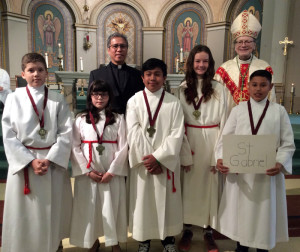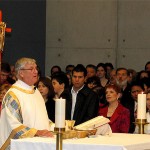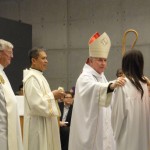LEST WE FORGET
Next Sunday, November 11th is Remembrance Day, a day to remember all who have served, and continue to serve in our armed forces, especially those who have died and those wounded in battle. We pray for healing and peace; that one day, all peoples will lay down their arms and embrace one another as brothers and sisters in one human family.
NOVEMBER IS THE MONTH OF ALL SOULS
BOOK OF REMEMBRANCE
A Book of Remembrance has been placed on the altar for the month of November. You are invited to write the names of your deceased relatives and friends in the book. They will be remembered at all the Masses celebrated in November.
DEVELOPMENT AND PEACE
Share the Journey Campaign
Did you know?
“31 people are forced to flee their home every minute!”
YOUTH GROUP MONTH IN REVIEW
The St. Gabriel’s Youth Group is excited to share a quick recap of our great events that took place this past month.
At the beginning of October, 30 youth took to the streets of downtown Toronto and distributed almost 100 meal packages consisting of a homemade sandwich, granola bar, and juice box to those in need. It was a very eye-opening and heart-warming experience. Our second outreach initiative was aimed towards helping the environment. We participated in the City of Toronto’s Community Stewardship Program and planted more than 20 trees and shrubs in Sunnybrook Park. Finally, we wrapped up this month’s festivities with a Halloween social filled with food, music, costumes, and games.
We also held two fundraisers to support the 9 young adults attending World Youth Day in Panama this January. Our Silent Auction was a huge success in which a total of $3800 was raised. We would like to thank all who helped organize the event, all who donated items to auction off, as well as all those who participated and placed bids. We also held our annual Halloween Bake Sale and raised more than $1800. Thank you to all who helped bakes, decorated, and purchased delicious baked goods.
We are so blessed to be a part of such a generous parish community and are grateful for your ongoing support!
COMING. UP……
We look forward to all that is in store for the youth group in the coming weeks, particularly our Talent Night that is taking place on Sunday November 25th. Please save the date and join us for a lovely evening as we showcase the talent of the young people of our parish.
FIRST COMMUNION INFORMATION MEETING
Thursday, November 15th at 7:30 PM.
St. Gabriel’s Church
There will be a meeting here at the Church on Thursday, November 15th at 7:30 PM. for parents of children who will be receiving the Sacrament of First Communion in 2019.
ANNOUNCED MASSES
November 5th to November 10th
MONDAY – ALL SOULS IN PURGATORY – Requested by John Chan
TUESDAY – VLADO PETRANOVIC – Requested by Mira Petranovic
WEDNESDAY – JOAN RUEST – Requested by her Family
THURSDAY – DON POWER – Requested by Fergus O’Connell
FRIDAY – PAULINE CHIU – Requested by the Chiu Family
SATURDAY – ALL DECEASED – Requested by Chiara & Tina Intini
R.C.I.A. AND ADULT FAITH DEVELOPMENT
Meetings in preparation for the R.C.I.A.
(Rites of Christian Initiation of Adults) will begin soon. These meetings are for persons interested in learning more about the Catholic Faith. The exploration may lead the candidate to seek baptism, and become a member of the Catholic Christian community; or for Christians already baptized into another Christian denomination, the reception into the Catholic Church.
Adult Catholics who have not received the sacrament of Confirmation but who wish to do so are also encouraged to attend these sessions.
As well, these meetings may be an opportunity for “Born Catholics” to deepen their understanding of our faith. Very often, especially for those of us who received our religious instruction at an early age, we tend to grow physically, mentally, psychologically etc., but the understanding of our faith does not grow correspondingly. The RCIA may serve as a good opportunity for us to ask questions and to develop a more adult understanding of our faith.
If you are interested in joining the RCIA meetings or if you would like to have more information about it, please contact the Parish Office at 416-221-8866.
SCHOOL AGE CHILDREN PREPARING FOR BAPTISM
If you have, or know of, school age children (ages 7 to 14) who wish to prepare for Baptism, please contact the Parish Office at 416-221-8866. Classes for them will begin soon.
HUMANITARIAN RELIEF
Areas of the Philippines were devastated by Typhoon Mangkhut on September 15th, with winds of up to 225 km/h. More than 80 people died as a result of the storm and related landslides, flash floods and destruction of homes, infrastructure and crops.
Days later, on September 28th, an earthquake off the coast of Sulawesi Island, Indonesia, caused a tsunami with waves six meters high. To date, more than 1300 people have been confirmed dead and many, many more remain missing.
In an effort to support the survivors of these two significant disasters, the Archdiocese of Toronto is accepting funds that will be sent through Caritas Internationalis, the official relief network of the Vatican. In both countries, Caritas agencies have deployed workers to provide food, drinking water, temporary shelter and medical support.
Those wishing to help may do so in the following ways:
• Online through the Archdiocese of Toronto website: www.archtoronto.org
• By phone through the Development Office – 416-934-3411
• Through the parish, making cheques payable to:
St. Gabriel’s Passionist Parish – 2018 Philippines / Indonesia – Disaster Relief
We offer our prayers for all those impacted by these natural disasters. Thank you for your ongoing efforts to assist those in crisis.
GOOD SHEPHERD CENTRE CASSEROLES
Thank you to the volunteers who prepared casseroles for October. For November, your prepared frozen casseroles will be collected at the Masses on the weekend of November 24th / 25th for delivery to the Good Shepherd Centre.
More volunteers are needed to become active in helping to feed our less fortunate sisters and brothers. Three different recipes are available in the Parish Office or online at the Church website. Casserole pans are also available in the Parish Office. If you require more information please contact Irene Albrecht at 416-221-2791.
FOOD FOR LESS FORTUNATE
Thank you for your generous support of Rosalie Hall and the Good Shepherd Centre. Your food donations are very much appreciated.
Rosalie Hall provides a wide range of child services for young parents and their children. Good Shepherd provides hot meals and shelter for the homeless in our city.
With everyone struggling at this time, your food donations are more important than ever. Please check the expiry dates before donating since we cannot pass on food that has expired.
THE GARDEN SHED
Would you like to see spring flowers scattered throughout the gardens next April? Join us on Saturday, November 10tn at 1:00 for a bulb-planting bee. No experience necessary. Children are welcome to get involved too.
Gardening workshops will resume in January. Stay tuned for topics and schedules. For information on the Gardening Ministry, contact Heather Bennett at heathermjb@gmail.com
‘GUIDANCE MATTERS’
Wednesday, November 21st, at 7:00 PM
St. Timothy Parish Hall, 21 Leith Hill Road
St. Michael’s College School, the leader in Catholic boys’ education, will be hosting an evening for students in elementary, middle, and high school, and their parents entitled ‘Guidance Matters’ on Wednesday, November 21st at 7:00 PM
Experienced St. Michael’s College School guidance counselors and members of the Student Affairs team will be present to share information and answer your questions about academics, course selection, high school preparation, student mental health and wellness and more. You can also email your questions in advance. The event is free and refreshments will be served. Seating is limited. Reserve your spot today at: guidancematters@smcsmail.com
DAY OF SPIRITUAL RECOLLECTION
Monday November 26 from 9:30 to 4:00 PM
Villa Colombo, 40 Playfair Avenue
In the beautiful surroundings of Villa Colombo, a day of Recollection will be held on Monday, November 26th from 9:30 AM to 4:00 PM. Under the direction of Fr. Raffaele Paonessa, it will be a preparation for the holy season of Advent. The cost is $42. Including lunch and two coffee breaks. Please reserve in person or by sending a cheque or money order, payable to Villa Colombo, attention Mirella (416 789 2113) before Tuesday, November 20th Tickets will not be sold at the door.
QUEEN OF APOSTLES ACTS RETREAT
Queen of Apostles Renewal Centre
1617 Blythe Rd., Mississauga
Women’s ACTS Retreats
Thursday, November 15th at 7:00 PM to Sunday, November 18th at 12:00 PM
Men’s ACTS Retreat
Thursday, November 29th at 7:00 PM to Sunday December 2nd at 12:00 PM.
The ACTS retreat is a three-day retreat led by those who have attended prior ACTS retreats. Men present men’s retreats; women present women’s retreats. The retreat focuses on adoration, community, theology and service. Scripture and the teachings of the Catholic Church are the guidelines. The goals are to renew yourself spiritually, to strengthen your faith and to apply it in your daily life, and to create lasting and supporting friendships.
Please contact Willy Klaudusz by phone at 647-281-5990 or on the website at https://actscanada.org/

 Founded by St. Paul of the Cross, every Passionist takes a special vow to spend his or her energies in promoting remembrance of the sufferings of Jesus, the memory of the Cross, and reflection of the meaning of the Cross for the world.
Founded by St. Paul of the Cross, every Passionist takes a special vow to spend his or her energies in promoting remembrance of the sufferings of Jesus, the memory of the Cross, and reflection of the meaning of the Cross for the world.




